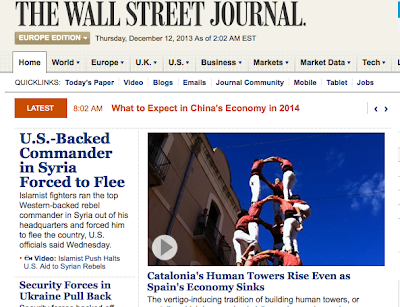Portada del Wall Street Journal el 13.12.2013 Imatge de naciodigital.cat
Catalonia Sets Nov. 9 as Date for Independence Referendum
Direct Challenge to Spain's Central Government

Notícia de la consulta catalana al Wall Street Journal
By MATT MOFFETT And DAVID ROMÁN
December 12, 2013 4:02 PM
MADRID—Political leaders in Spain's wealthy Catalonia region have set a
date for a referendum on declaring independence, but the Spanish prime
minister flatly stated such a vote was unconstitutional and wouldn't be
permitted.
The preparation for a secession vote in Catalonia, which
has long chafed under what it calls economic and cultural dominance from
Madrid, sets Spain's leading industrial region on a collision course
with the central government. The stakes for both sides are enormous and
the outcome hard to predict.
Catalan regional leader Artur Mas
said Thursday that the region's major political parties had agreed on
wording of a two-part question to be put on a ballot Nov. 9, 2014.
The first part is: "Do you want Catalonia to be a State?" The second
part is: "Do you want Catalonia to be an independent State?"
Mr.
Mas, who had pledged to hold a referendum after elections last year,
said the question was "inclusive, and at the same time, clear and
concrete." He added that there would be more details in coming days on
how the vote would be conducted.
But at his own news conference,
Prime Minister Mariano Rajoy said unequivocally he wouldn't stand for
such a vote. "It is unconstitutional and it isn't going to be held," he
said, calling it "beyond all discussion and all negotiation."
He
didn't answer follow-up questions on how he aimed to thwart the Catalan
bid, but analysts said the national government would almost certainly
sue to block the vote in Spain's constitutional court.
Strains have
long existed between Madrid and Catalonia, which has a distinctive
language and culture, but the economic crisis that has battered Spain
since 2008 has raised the tensions to a boiling point.
Catalans
complain that the central government drains the region of resources to
support the rest of the country while returning little in investment.
Some 43 cents of every euro Catalonia pays in taxes doesn't come home,
according to data compiled by the Catalonia government.
National
government officials say they have aided Catalonia in matters such as a
huge bailout of a regional bank, and that many of Catalonia's problems
are a consequence of local mismanagement.
Nevertheless, Catalonia's
discontent has given rise to massive pro-independence demonstrations in
recent years. This past Sept 11, a regional holiday, more than 1 million
independence activists formed a 250-mile human chain running the length
of the region.
Recent polls indicate that around 80% of Catalonia's
7.5 million people favor a referendum. Some polls show a much narrower
majority favoring independence, though how the question is phrased has
an important bearing on the result.
Some legal analysts said that
the central government would have a strong case in suing to block the
referendum. "Under the constitution, it is clear that only the central
government can call a referendum," said Fernando Simón Yarza, a
professor of constitutional law at the University of Navarra.
Nevertheless, simply dismissing the referendum-backers out of hand bears
risks for Mr. Rajoy. "There is wide social support for this proposal,"
said Joan Botella, a political scientist the Autonomous University of
Barcelona.
He still bets the vote won't come off, but called it is "a very complicated" situation for the national government.
The Catalan challenge comes at a time when Mr. Rajoy is trying to build
on some modest improvement in the long sickly Spanish economy.
Spain recently exited a nine-quarter recession. The stock market has
surged and investors such as Bill Gates and Carlos Slim have recently
placed bets on Spain. A secession crisis involving a region known as
"the factory of Spain" could quickly curb that positive momentum,
analysts say.
Mr. Rajoy lashed out at "initiatives that fracture
society, encourage divisions and generate uncertainty among the
citizenry in time when there is a need for certainty."
The Catalan
activists face challenges of their own. The bifurcated referendum ballot
reflects divisions within Mr. Mas's ideologically diverse coalition
about how far to push the independence issue.
Some coalition members
advocated "a third way"—the adoption of a federalist system conferring
greater powers on the regional government, but keeping Catalonia within
Spain.
The ballot has been designed to give a nod to such
federalists, who could conceivably vote "yes" on the first question
about Catalonia becoming a state, and "no" on the second, about it
becoming an independent state.
Some more ardent independence
activists were disappointed that Mr. Mas didn't come up with a simple
yes or no question. "I wanted something explicit that would force the
federalists make a choice," said Elisenda Paluzie i Hernández, an
independence supporter who is dean of economics at the University of
Barcelona.
Nevertheless she says she understands the political
constraints, and feels the independence option will gain backing from
Catalans whose experience has made them deeply distrustful of Madrid.
Many Catalans are still embittered by a move by a Spanish court in 2010
to strike down key parts of a painstakingly negotiated statute that
would have granted more autonomy to Catalonia.
Write to Matt Moffett at matthew.moffett@wsj.com

Cap comentari:
Publica un comentari a l'entrada